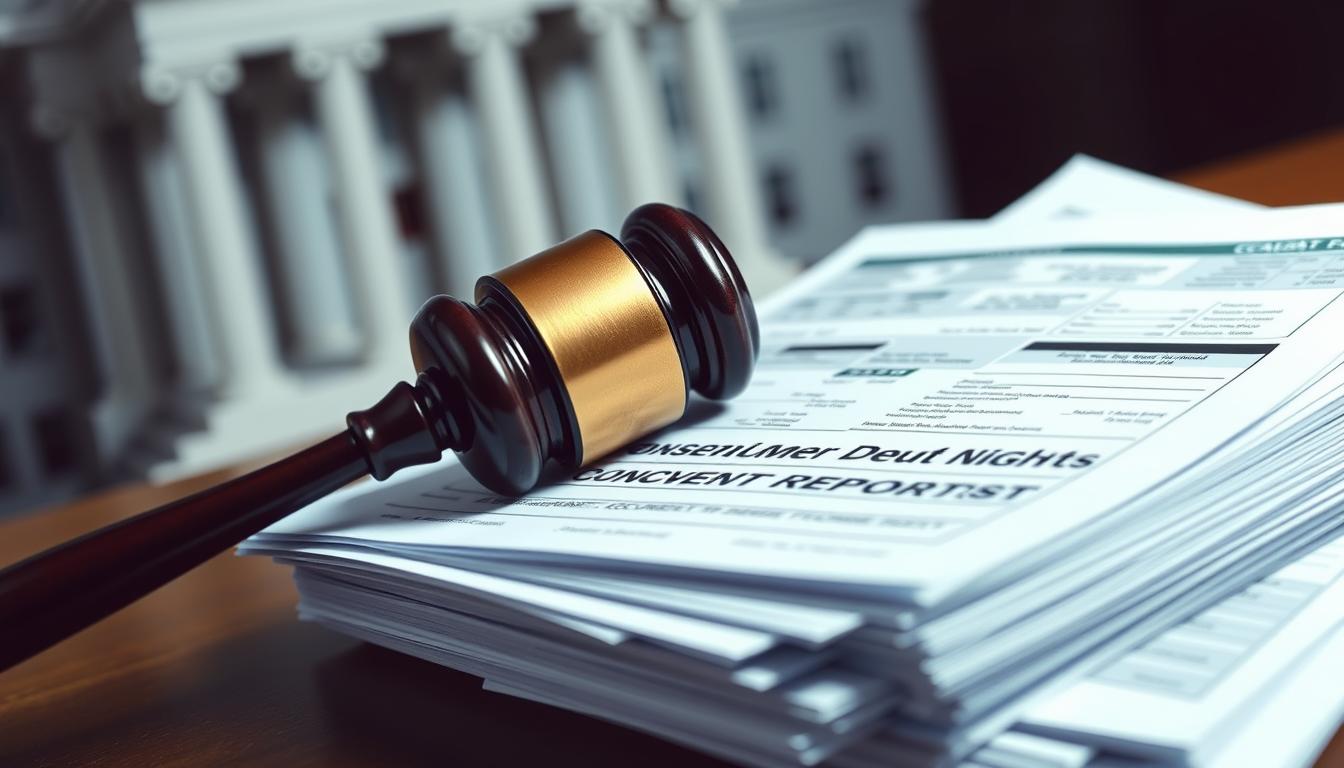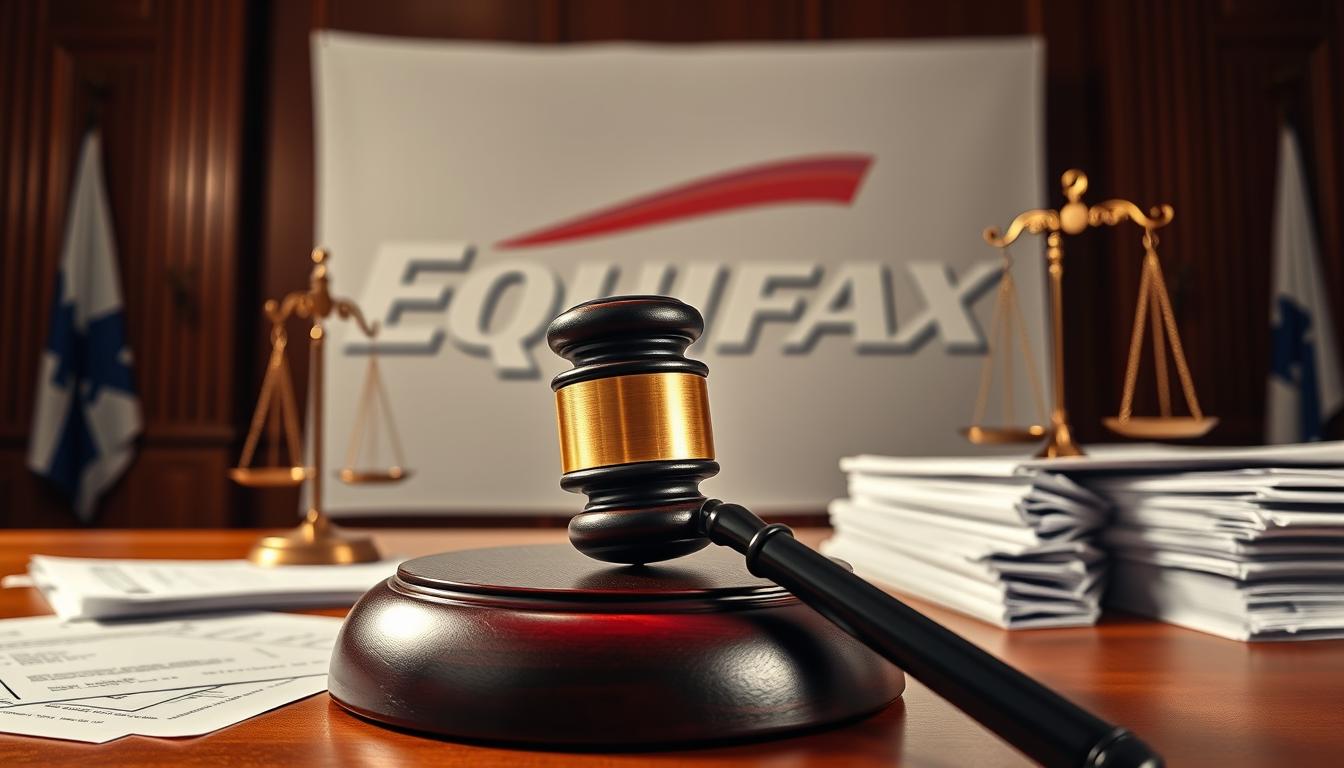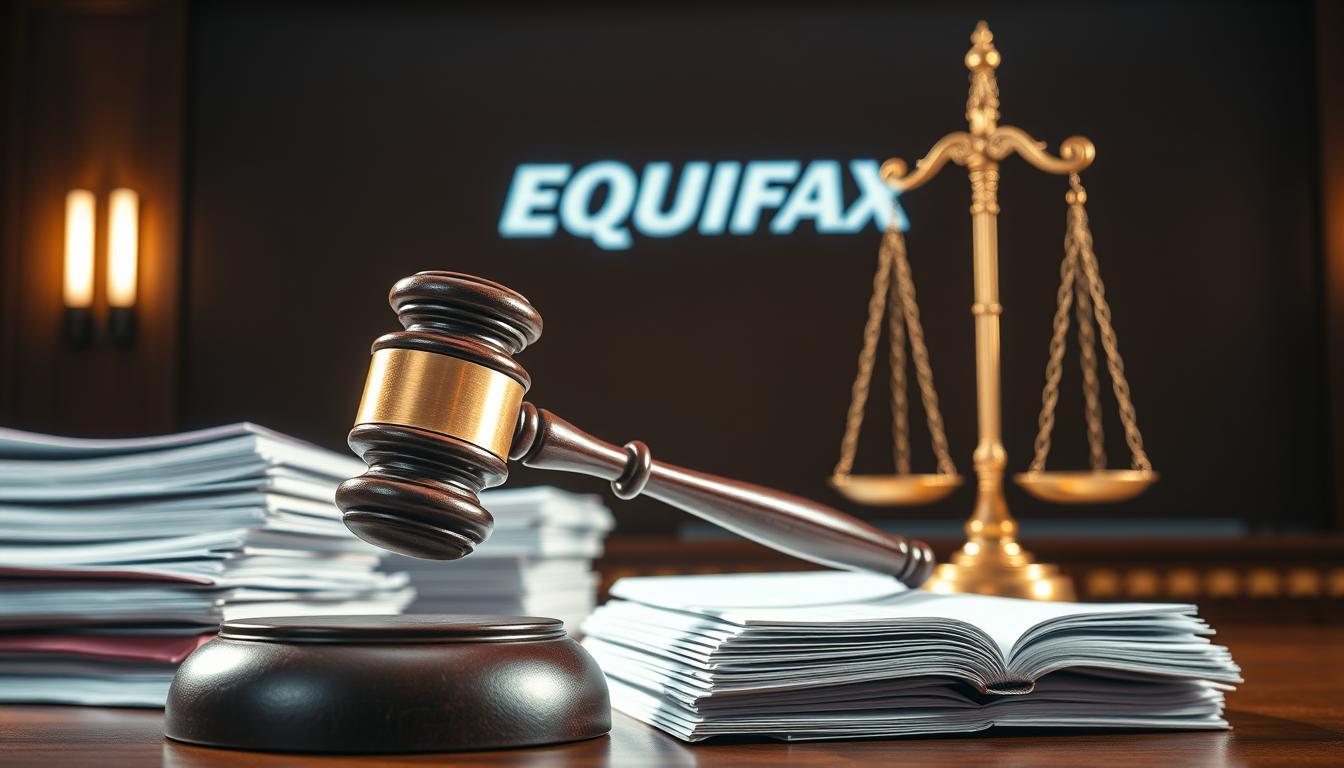Millions of Americans were affected by the Equifax data breach. Some have found errors in their credit reports. If you’re one of them, you might have grounds to sue Equifax.
Suing a credit reporting agency can be tricky. This guide will help you navigate the process. We’ll show you how to file a successful lawsuit against Equifax.
Key Takeaways
- Understand your rights under the Fair Credit Reporting Act (FCRA) and grounds for suing Equifax
- Gather evidence of Equifax’s wrongdoing, such as credit report errors or identity theft incidents
- Prepare legal documents, including a detailed complaint, to file your lawsuit against Equifax
- Navigate the legal process and respond to Equifax’s defenses
- Seek compensation for economic and non-economic damages, including identity theft protection
This guide will arm you with essential knowledge and tools. You’ll learn how to hold Equifax accountable for their actions. We’ll show you how to protect your financial well-being.
Let’s explore the steps to sue Equifax and seek justice. You deserve fair treatment and compensation for any harm caused.
Understanding Your Rights as a Consumer
The Fair Credit Reporting Act (FCRA) protects your credit report rights. It ensures credit agencies like Equifax keep accurate, fair information about you. You have specific rights under this act.
Fair Credit Reporting Act (FCRA) Protections
The FCRA gives you important rights regarding your credit report. You can access your report and dispute any errors. You may seek damages if agencies don’t investigate or fix mistakes.
This law guards against credit report errors and provides identity theft protection. It’s a vital tool for consumers.
Grounds for Suing Equifax
You might sue Equifax if they fail to meet FCRA obligations. Reasons could include negligence in maintaining accurate consumer rights. Willful FCRA violations are also grounds for legal action.
Failure to protect your data during breaches, like in 2017, may warrant a lawsuit. Knowing your fair credit reporting act rights helps you protect your credit report.

“The FCRA is a crucial law that empowers consumers to maintain control over their credit information and protect themselves from unfair practices.”
| FCRA Protections | Grounds for Suing Equifax |
|---|---|
|
|
Gathering Evidence of Equifax’s Wrongdoing
Gathering solid evidence is key to suing Equifax successfully. Your case depends on thorough documentation of the credit agency’s mistakes. Be meticulous in collecting proof of their wrongdoing.
Collect documents related to credit report errors caused by the Equifax data breach. Include credit report copies and correspondence with Equifax about the errors. Also, gather proof of financial harm or identity theft you’ve experienced.
- Gather copies of your credit reports from all three major credit bureaus (Equifax, Experian, and TransUnion) to identify any discrepancies or inaccuracies.
- Document any attempts you’ve made to resolve the credit report errors with Equifax, including dates, contacts, and the responses you received.
- Collect evidence of any identity theft or financial losses you’ve experienced due to the Equifax data breach, such as fraudulent accounts, unauthorized charges, or out-of-pocket expenses.
Find public information about the Equifax data breach and the company’s response. Look for news articles, regulatory filings, and court documents. These can reveal Equifax’s negligence or misconduct.
| Type of Evidence | Examples |
|---|---|
| Credit Report Errors |
|
| Identity Theft and Financial Losses |
|
| Equifax Data Breach Information |
|
A comprehensive set of evidence strengthens your case against Equifax. It boosts your chances of winning the lawsuit. Your thorough preparation can lead to a favorable outcome.

Preparing Legal Documents and Filings
Gathering evidence is the first step in your case against Equifax. Next, you’ll need to prepare legal documents for filing a lawsuit. This involves drafting a detailed complaint outlining FCRA violations and damages suffered.
Drafting a Complaint
The complaint is the initial document that starts the equifax lawsuit process. It must clearly state your case against the company. Your complaint should include specific details about Equifax’s actions and how they affected you.
- Explanation of your consumer rights under the FCRA that Equifax has violated
- Detailed account of the specific incidents or issues you have faced, such as identity theft, credit score damage, or financial losses
- Quantification of the damages you have incurred, including both economic and non-economic harms
- Specific relief or compensation you are seeking from Equifax, such as monetary damages, credit report corrections, or injunctive relief
Filing the Lawsuit
After drafting the complaint, you’ll need to file it with the right court. This could be a federal district court or a state court. The choice depends on your claims.
It’s wise to consult an experienced consumer rights attorney. They can help you follow correct filing procedures and meet all deadlines. Taking these steps can help hold Equifax accountable for its actions.
| Key Steps in Preparing Legal Documents | Description |
|---|---|
| Drafting the Complaint | Clearly articulate the FCRA violations, damages, and relief sought |
| Filing the Lawsuit | Submit the complaint to the appropriate federal or state court |
How to I Sue Equifax: Step-by-Step Guide
Equifax’s data breach may have affected you, prompting legal action. Suing Equifax can be complex, but proper guidance can help you seek compensation.
This guide will walk you through the steps to sue Equifax. You’ll learn how to navigate the legal system and protect your rights.
- Determine the Appropriate Court: Your case may require filing in state or federal court. A consumer rights attorney can help you choose the best venue for your legal process.
- Gather Evidence of Equifax’s Wrongdoing: Collect documents showing Equifax’s negligence or Fair Credit Reporting Act (FCRA) violations. This evidence supports your consumer rights claim.
- Calculate Your Damages: Assess financial and non-financial losses from Equifax’s actions. Include costs for identity theft, credit monitoring, and emotional distress.
- File the Lawsuit: Draft a complaint with your attorney detailing your case’s facts and legal grounds. Once filed, Equifax will be served, starting the legal process.
- Participate in the Litigation Process: Prepare for discovery, negotiations, and a potential trial. Your attorney will guide you, protecting your rights throughout.
Success in suing Equifax depends on working with an experienced consumer rights attorney. They’ll navigate the complex legal process and help maximize your chances of a favorable outcome.

“The best way to protect your rights is to take action and hold Equifax accountable for their negligence.”
Potential Damages and Compensation
Suing Equifax may lead to various forms of compensation. These can include economic damages like out-of-pocket expenses and lost wages. Non-economic damages, such as emotional distress, may also be recoverable under the Fair Credit Reporting Act.
Economic Damages
Economic damages are tangible financial losses from Equifax’s credit report errors or identity theft. These can include out-of-pocket expenses for freezing credit and resolving fraudulent accounts.
Lost wages due to time spent addressing the Equifax settlement may also be recoverable. Additionally, costs for credit monitoring or identity theft protection services can be included.
Non-Economic Damages
Non-economic damages are more subjective. These can include:
- Emotional distress from anxiety and stress caused by the Equifax data breach.
- Reputational harm if the breach damaged your credit history or public image.
- Loss of privacy and violation of your personal information’s security.
The damages you may receive depend on your case details and local laws. Consult an experienced attorney to understand your rights and potential recovery options.

Navigating the Legal Process
Suing Equifax can be complex. You’ll need to be ready for the company’s defenses. Your attorney will protect your consumer rights throughout the legal process.
Equifax may argue your equifax lawsuit claims are unjustified. They might say you haven’t suffered significant harm. Your lawyer will counter these arguments effectively.
Responding to Equifax’s Defenses
Equifax may use various strategies to defend itself. They could claim errors didn’t cause you harm. Or, they might say they acted in good faith.
Your legal team will gather evidence carefully. They’ll build a strong case to prove your claims. This will help refute Equifax’s defenses.
| Potential Equifax Defenses | Strategies to Counter Them |
|---|---|
| No Tangible Harm Caused | Demonstrate the actual financial, emotional, and reputational damages you’ve incurred |
| Good Faith Compliance with the Law | Prove Equifax’s negligence, recklessness, or willful disregard of your consumer rights |
| Statute of Limitations Expired | Argue that the statute of limitations was tolled or that the violations are continuing |
Work closely with your attorney to present a compelling case. This can help you overcome Equifax’s defenses. It increases your chances of a favorable outcome.
Equifax Data Breach and Its Consequences
The 2017 Equifax data breach exposed sensitive info of millions of Americans. It opened the door to widespread identity theft and credit report errors. This security failure has challenged people’s financial well-being and credit standing.
The breach affected over 147 million people’s data. It included Social Security numbers, birth dates, addresses, and some credit card numbers. This info allowed cybercriminals to open fake accounts and take out loans.
Consumers have reported many credit report errors due to this breach. These include unauthorized accounts and wrong info, hurting credit scores. Many now struggle to get loans, mortgages, or jobs.
| Impact of Equifax Data Breach | Percentage of Affected Consumers |
|---|---|
| Experienced identity theft | 33% |
| Encountered credit report errors | 42% |
| Faced difficulty securing loans or credit | 29% |
The Equifax breach shows the need for strong consumer rights and better data security. It’s vital for people to watch their credit reports closely. Taking steps to protect your financial health is crucial.
Protecting Your Credit and Identity
Your credit and identity need protection after data breaches or report errors. There are steps you can take to safeguard your personal information. These actions will help secure your financial well-being.
Credit Monitoring Services
Credit monitoring services help fight identity theft. They watch your credit reports from major bureaus and alert you to suspicious activity. Regular reviews can identify and address issues quickly.
This prevents further damage to your credit score. It also protects your financial standing from potential threats.
Identity Theft Protection Tips
Besides credit monitoring, you can take more steps to protect yourself. Here are some ways to guard against identity theft:
- Regularly review your Equifax credit report for any discrepancies or unauthorized activity.
- Implement credit monitoring to receive alerts about changes to your credit profile.
- Consider enrolling in an identity theft protection program to receive comprehensive monitoring and assistance in the event of identity theft.
- Be cautious when sharing your consumer rights information, especially online or over the phone.
- Shred any documents containing sensitive personal or financial information before disposing of them.
Taking these steps can lower your risk of identity theft. They help protect your credit and secure your financial future.
| Service | Key Features | Cost |
|---|---|---|
| Equifax Credit Monitoring |
| $19.95 per month |
| Identity Theft Protection |
| $9.99 per month |
“Protecting your credit and identity is essential in today’s digital world. Take the necessary steps to safeguard your personal information and financial well-being.”
Alternatives to Suing Equifax
Legal action isn’t the only way to seek compensation from Equifax. There are other options worth exploring. These include joining class-action settlements or using Equifax’s credit monitoring services.
The Equifax data breach led to a $700 million settlement. Affected individuals can choose between cash or free credit monitoring. Opting for credit monitoring can protect your financial information without a legal battle.
The Fair Credit Reporting Act (FCRA) offers consumers various protections. It gives you the right to dispute incorrect information on your credit reports. Using these rights may help fix credit issues without suing Equifax.

